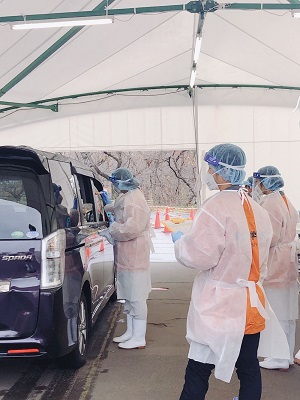2020.12.4
Work on Drive-Through PCR Testing for Screening COVID-19 as a DMAT Member

Assistant Professor Yohei Inaba
Disaster Medical Science Division
Assist. Prof. Yohei Inaba of IRIDeS is an expert in the field of radiation disaster medicine. His research interests include how to estimate an individual radiation dose quickly during a radiation disaster. Alongside his research and educational activities, Inaba has also started working as a Disaster Medical Assistance Team (DMAT) member back in December 2018.
DMATs consist of trained doctors, nurses, and operation coordinators with the core task of saving human lives in times of a disaster. In DMAT, Assist. Prof. Inaba is a qualified operation coordinator. DMAT operation coordinators are in charge of logistics, coordinating flows of people and goods, negotiating with other involved organizations, and collecting and analyzing necessary information; all in order to ensure that doctors and nurses can work efficiently and
smoothly.
Usually, DMAT focuses on disasters caused by natural hazards, but they are currently making an effort to respond to the spread of COVID-19. Inaba has been working on polymerase chain reaction (PCR) testing, using a drive-through system in Miyagi Prefecture since April 2020. First, Assist. Prof. Inaba established a system for conducting the test safely by collaborating with medical personnel, staff members of municipalities of Miyagi Prefecture and the City of Sendai, and Self-Defense Force personnel. Second, he continues his efforts to ensure that their drive-through PCR testing is done safely and efficiently.

A drive-through test for screening COVID-19
(photo courtesy by Dr.Yohei Inaba)
As things currently stand, it takes approximately two minutes per car for their drive-through PCR testing; this entails identification, interview, temperature measurement, and a PCR test. Anomalies that deviate from the initial assumptions also occur on a daily basis, however. For example, when a large number of people come for testing all at once after a large-scale outbreak. In such a case, Inaba reconstructs the flow of people and goods into a more flexible method, all while ensuring safety, to keep testing without any delay. The highest number of
tests their station has ever conducted was 99 per day. Inaba is at the stressful front line, while staff members have to face many taxing operations and the constant risk of infection. Working with protective attire is grueling. Furthermore, since they operate testing in an outdoor tent, they have to deal with other issues like heat stroke during the summer, when temperatures can reach 40℃, and of the bitter cold during the winter.
A part of the number of PCR positive cases we see in the daily news are derived from the steady and persistent efforts of Assist. Prof. Inaba and his team. Their drive-through PCR testing has already become indispensable for society, but they are facing difficulties in this protracted pandemic. Inaba says, “We never know how long we have to keep operating for this infectious disease, which is different from our regular DMAT mission for other natural hazard disasters. Mental health care needs to be considered for medical personnel who have been tense for a long term.” Drive-through PCR testing has been carried on by their high motivation. It is now a pressing issue of how society will efficiently and safely outlast this prolonged pandemic while cooperating with healthcare workers.
